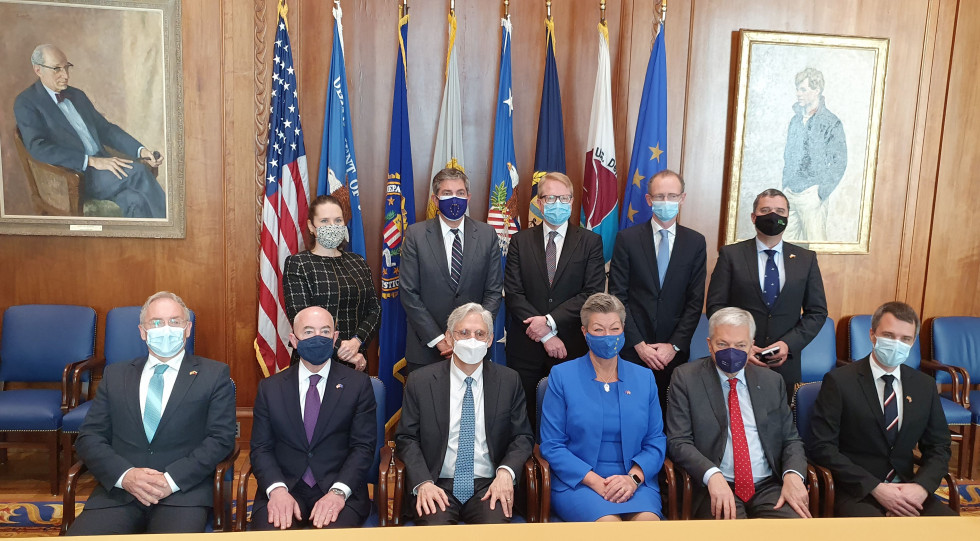The Minister of the Interior Aleš Hojs and the Minister of Justice Marjan Dikaučič, current Chairs of the EU Home Affairs Council and EU Justice Council respectively, attended the EU-US Justice and Home Affairs ministerial meeting in Washington on 16 December 2021. The ministerial meeting was also attended by the European Home Affairs Commissioner Ylva Johansson, the Justice Commissioner Didier Reynders, a delegation of the General Secretariat of the EU Council, the EU Counter-Terrorism Coordinator Ilkka Salmi, the Executive Director of Europol Catherine de Bolle and the President of Eurojust Ladislav Hamran.The meeting agenda was dedicated to justice and home affairs topics of shared EU and US interest.
“The goal of the meeting with our transatlantic partners is to strengthen the cooperation and the resilience of our societies and so contribute to a higher level of security in the EU and the world. We will reaffirm this commitment in a joint statement,” Slovenian Minister of the Interior Aleš Hojs and current Chair of the EU Home Affairs Council said at the start of the meeting. He also used the occasion to confirm that cooperation between Slovenia and the US in the area of home affairs is very successful.
Minister Hojs continued by presenting the key achievements of the Slovenian Presidency of the Council of the EU in the area of home affairs, where he particularly highlighted the prevention and investigation of child sexual abuse. In November, Slovenia convened a conference dedicated to this topic, which was attended by EU ministers, ministers of the Western Balkan partner countries and representatives of the United States. They issued a joint statement in which they emphasised the need for preventive action and awareness-raising and expressed political support for the establishment of adequate tools for the detection and investigation of child sexual abuse – one of the most serious crimes, due to the wide-ranging and life-long consequences for its victims. “We believe it is important now to follow-up on the main takeaways of the November conference. We must step up our awareness-raising campaigns regarding the magnitude of child sexual abuse. We must also address the main challenges faced by national investigators to tackle child sexual abuse, namely the volume and access to data, encryption and the use of artificial intelligence to improve existing investigative tools.”
The discussion on migration developments, including the fight against migrant smuggling and their instrumentalisation was an important topic on the agenda. Minister Hojs presented the Slovenian Presidency’s activities in the framework of the EU’s response to the attempts by Belarus to instrumentalise people for political purposes, and went on to say: “We count on the support of our US allies on this issue.” The EU is also focusing on the management of the targeted external borders, with strong measures aimed at tackling human smuggling. The large majority of all migrants arriving in the EU are in fact supported by migrant smugglers. In September the Commission presented a renewed EU action plan against migrant smuggling for 2021–2025, which sets out the key pillars and the concrete actions needed to counter and prevent smuggling. Minister Hojs concluded by saying: “We count on the cooperation of the US to make our actions even more effective. In this context, we welcome that the US has expressed interest in participating in the EMPACT Operational Action Plans for 2022 on migrant smuggling and trafficking of human beings.”
On the subject of combating terrorism, the minister highlighted the excellent operational cooperation between EU and US Agencies. “As Chair of the Council, I would like to express the EU member states’ appreciation for the information the US has been making available on suspected foreign terrorist fighters. I would also like to underline the importance of ensuring Europol’s access to this data. Europol brings added value to EU member states’ terrorism investigations.” The minister then addressed the situation in Afghanistan and its security implications: “In late August, I chaired a meeting of EU ministers of the interior, where we concluded that we would do our utmost to ensure that the situation in Afghanistan does not lead to new security threats for EU citizens. This has been our concern ever since, and it is the guiding principle of the Counterterrorism Action Plan on Afghanistan prepared by the EU Counter Terrorism Coordinator. This also involves close cooperation with trusted partners such as the United States when it comes to threat assessments and the exchange of information and intelligence.”
Source: gov.si


